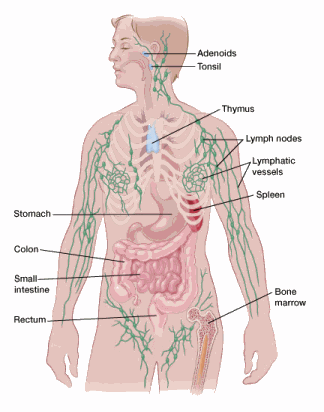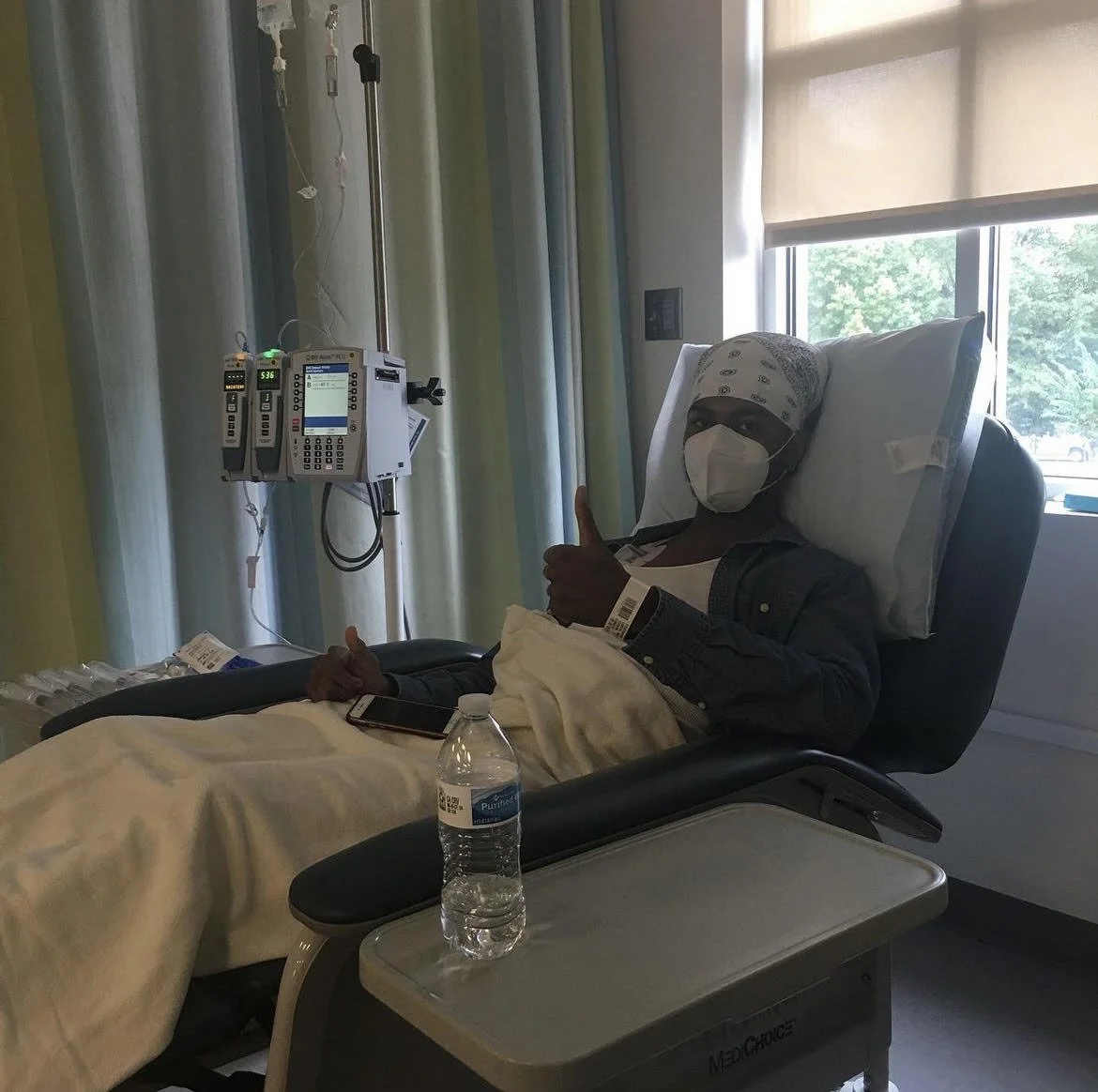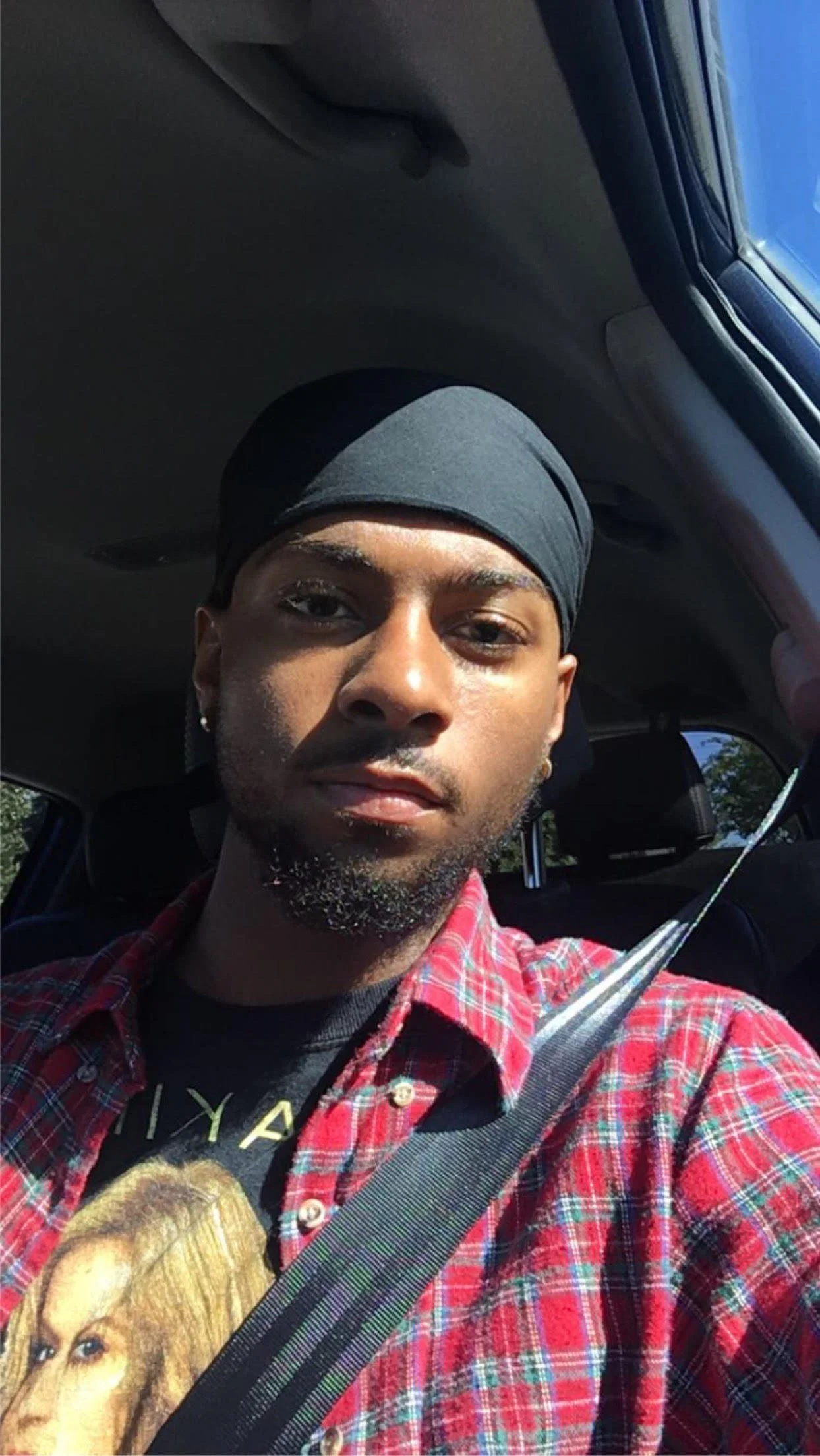10 Questions About Cancer Answered by a Cancer Survivor
Written by Melissa Schenkman MPH, MSJ
Mark Larche is known for pushing himself beyond his limits to stay healthy. A former high school athlete who excelled at playing soccer, he trains three to five days a week and practices clean eating by eating whole foods. Needless to say, he was under the impression that he was in great shape.
“I have trained like this for the purpose of living a long healthy life,” Larche said. But sometimes even our best efforts can get derailed by things beyond our control.”
One day, Larche started waking up to work out in the morning and then began finding himself completely exhausted the rest of the day with fatigue so bad that he would be bedridden. As time went on, he started to notice other things too: a loss of appetite and swollen lymph nodes on both sides of his neck, armpits, and some on his back.
Visits to two different doctors later, he learned why he went from a being high-octane individual—not only working out consistently but also attending college classes at Georgia State University to pursue his degree in finance and simultaneously working at Lowes—to no longer being able to push himself at all. At just 20 years old, he received his diagnosis: Stage IV Hodgkin’s Lymphoma.
In Hodgkin’s Lymphoma, our white blood cells, known as lymphocytes, grow out of control. It is a kind of cancer that affects our lymphatic system—a network throughout our bodies that is a big part of our immune (disease-fighting) system. It contains lymph nodes or hubs where our white blood cells take up residence. Due to the uncontrolled growth of white blood cells in Hodgkin’s, the lymph nodes throughout the body swell—a telltale sign of the disease’s presence.
Larche shares with us the insights he has gained from his cancer diagnosis, treatment, and about life since becoming a cancer survivor, to help fellow Gen Z, millennials, and their families better understand how to help others during their cancer journeys.
What were your initial thoughts when you learned you had Stage IV Hodgkin’s Lymphoma?
Hearing I was diagnosed with Lymphoma cut me like a knife. I wasn't expecting to hear something like that at all. Not to be boastful, but I'm a very healthy individual, so I thought I was in much better health than I was.
One thing that I was very concerned about was being infertile, because I do want a family and would be devastated if that option was taken from me.
The lymphatic system, which is directly affected by Hodgkin’s Lymphoma. Source: American Cancer Society
What would you like people to know about millennials and Gen Zers who have had cancer and have been through cancer treatment?
There are five things that I think people should know that they might not realize about how it feels when you are diagnosed with cancer and have treatment when you are young.
#1 Isolation
Having cancer is isolating. I felt alone. I felt no one knew what it felt like to be me.
#2 It’s a Mental & Spiritual Battle
Consistently going back to a place that provides you “medicine” to eradicate a malignant tumor is a real test of your spirit and willpower. It’s not easy enduring the side effects of chemotherapy and knowing the more treatments you take, the more intense the side effects. All I could think was stopping and finding alternative methods to treat the cancer.
#3 Food intolerance
I love to eat, and having lymphoma made it hard to enjoy food. My sense of taste and smell was completely different. I could eat little to no greasy foods, and smelling it was nauseating.
#4 Anger
A cancer diagnosis comes with anger. This ties into Isolation. I did not know why I was here and what I did to deserve this kind of punishment.
#5 You Develop a New Sense of self
In the midst of it all, I developed a sense of self. There were a lot of things that I was thinking about as many different drugs were pumped into my body. But something dawned on me, and I did not quite know the terminology for it at the time, but I later discovered this concept was called the law of equivalent exchange, which states, "For anything given you must receive something of people with greater value and for anything received or expected you must sacrifice or give something of equal or greater value."
I realized on the other side of treatment, chemotherapy, and all of the side effects that came with it, there's something so much greater for my life that I must bring to manifest, and this realization brought me to become stronger in my spiritual beliefs as a Christian and discipline in my health as well as my finances. I became more assertive and serious about me. When I pray, it is never with a feeling of despair or hopelessness, but with conviction and strong belief, that I will get what I want out of life, not because I'm selfish but because I know that this desire to become wealthy was meant for me.
Although it was difficult, I continued to work out during my treatment which in turn made me more resilient and I inadvertently developed a much higher tolerance for pain. I wore Hodgkin's Lymphoma on my chest and walked proudly.
Larche during his cycles of chemotherapy treatment.
What do you wish your friends and family had understood at the time you were going through treatment?
My family was very supportive of me during treatment, but one thing that bothered me while I was consistently going to the hospital or chemotherapy was his feeling of loneliness. There would be times where I would come downstairs to get some water or get something to eat, and I can overhear my mom or dad just say, ’Mark's coming. Put your mask on.’
Now I know they were doing that to protect me, but during that time, all I could think about was, ‘I'm not normal anymore.’ So, the first few months during my treatment, which had to have been about four months and that was eight cycles, I endured depression that I spoke very little about.
I was depressed because I felt like I was not getting anywhere. It really just felt like God turned his back on me and that I was being punished and didn't know why. I've always had high expectations for myself and always planned on following through all things I desire, but when I received my diagnosis, I felt like it was over, and I even contemplated suicide, but I didn't have the guts to take myself out. I was really just waiting for the chemotherapy to overwhelm me.
Are there any specific activities or practices that you found beneficial for your physical and emotional well-being during and after cancer treatment?
There were not any particular practices that I indulged in to overcome my depression, but there was something that I had to understand. I realized that you needed to be careful about what your mind and your heart dwells upon. I am a firm believer that your world is shaped around how you think, because our body is the vessel through which our mind, our soul, and our spirit operates. If you dwell upon an idea to where you can clearly see it in your mind's eye and your emotions have fused with this idea and you believe it so, it will manifest itself into your world.
A great example is losing weight or getting in shape. If you can imagine yourself with six- pack abs or in very great shape, and you think about this long and hard every day to where you believe this will be you, God or whatever you believe in, will find a way to bring your burning desire into its physical equivalent.
So, when it comes to depression, you must consistently imagine a life better than the one that you are currently in and think of yourself highly. You must do this every day. It takes practice, but as time goes on, when you continue to impress this idea on your mind over and over again, you literally hypnotize yourself into believing it. Then suddenly, you are where you imagined yourself to be.
Something that you can do now that I've been doing for the last two months is falling asleep to positive affirmations, which helps destroy any negative mental programs.
What is your advice for friends or family members who want to help someone in their 20s, 30s, or early 40s who is going through cancer treatment?
#1 Stay in Touch
Staying in touch with that person goes a long way. I believe this is the most important thing you can do because people can always pretend to be okay, but I believe a lot of people become really good at masking their emotions, their true feelings. So, I highly encourage having consistent communication with the friend or family member going through treatment, not constant because you wouldn't don't want to pester them but just reminding him or her that you're here for them is fantastic.
#2 Offer Words of Encouragement
Give them words of encouragement to help to fortify their mind. It's okay that you are not able to identify with their pain or with their current situation, but they need someone to help them push on. They need a reason to keep living. So, spark conversation about their dreams, their goals, the things they really want out of life, and reinforce those dreams with positive affirmation.
#3 Distract Them with Entertaining Activities
Whether I am by myself or amongst company, the last thing that I want to think about is my cancer or the treatment, so anything to distract me from then would be great. That can be anything from TV shows or movies to video games. When I was going through my treatment, video games were a very good outlet for me to distract myself and take my mind off of chemo.
Did you experience any long-term side effects or complications from your cancer treatment? If so, how have you managed them?
I have not had any long-term side effects from the chemotherapy. The only thing I thought I would have for a long period of time was neuropathy (nerve damage giving you a prickling, burning, or numbing feeling) of my fingers and toes, but those side effects disappeared after about three months.
Larche after completing cancer treatment.
What lifestyle changes, if any, have you made since completing your cancer treatment?
Since overcoming my depression, my lifestyle has been pretty consistent since January 2021. I work out 3-5 times a week and fast between 36 to 48 hours of every week. I am being very conscious about what I eat, and making sure to focus on manifesting good health, wealth, and abundance.
When you meet new people who do not yet know you are a cancer survivor, what is your advice on when and how to share that information with them?
I will mention that I've been through chemotherapy and was previously diagnosed with cancer if the conversation naturally moves in that direction, but I find that people are not receptive to advice, instruction, lecturing or a life story when they don't ask for it.
What are the best ways for a friend to engage with and help their friends once they learn that someone they know has been through a cancer journey?
The two ways that I think you can really help someone are by:
#1 Listen to them
Being a listening ear for someone goes a long way. Even if you don’t completely identify with their situation, showing that you care and will be there for them will mean so much, whether they express it or not.
#2 Act as a distraction
Cancer is not for the faint of heart and dwelling upon things that you have to go through or things that you have gone through can be a real killjoy, so if you can distract the patient with anything that will make them happy, whether that be entertainment like TV, movies, video games, or just really good conversation, or even taking them out somewhere and showing them a good time, then I am confident that they would love to keep you around.
Larche before going through cancer treatment.
As a cancer survivor, what is your advice for those who have not had cancer on how they should view their health and manage it?
My advice to cancer survivors would be the same as it is to those who have not had cancer. Everything in moderation is the key, and being able to withdraw for a period of time from the things you like, helps you to appreciate them that much more.
For Larche, hearing the words, ‘You have cancer,’ changed his life moving forward, but ultimately, he reflects, it changed it for the better.
“I love life, and life is meant to be lived fully,” Larche said. “Cancer taught me to accept the things you want and to deny the things you don't want. It's as simple as that.”
Subscribe to the YMyHealth newsletter to stay up to date on everything that’s health-related for millennials!







